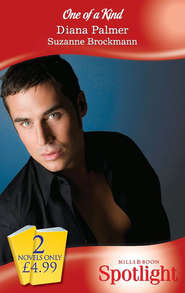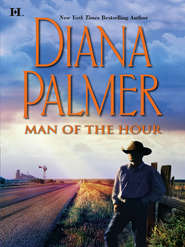По всем вопросам обращайтесь на: info@litportal.ru
(©) 2003-2024.
✖
Once in Paris
Автор
Год написания книги
2018
Настройки чтения
Размер шрифта
Высота строк
Поля
The thought amused her and she smiled. He looked very prosperous. He was wearing a cream-striped sport coat with white slacks and a beige shirt. No tie. He had a thin gold watch on his right wrist and a wedding ring on his left ring finger. He was holding the cigar in his left hand, so presumably he was left-handed.
He turned, and she got a glimpse of a broad, darkly tanned face. His mouth was firm and thin and wide, and his nose had a crook in it. There was a faint cleft in his chin. He had heavy dark eyebrows over large black eyes. He looked fascinating. He also looked familiar. She couldn’t quite remember…oh, yes. Her stepfather had given a party after the wedding for some business associates, and this man had been there. He was something big in construction. Hutton. That was it. L. Pierce Hutton. He headed up Hutton Construction Corporation, which specialized in building transatlantic oil drilling platforms and also high-rise, high-tech buildings. He was an architect of some note, especially in ecological circles, and conservative politicians didn’t like him because he opposed slipshod conservation methods. Yes. She remembered him. His wife had just died. That was three months ago, but he didn’t look as if he’d done much healing.
She approached him, drawn by the look of him. He was still staring at the painting as if he’d like to set a match to it.
“It’s very famous. Don’t you like it?” she asked at his side, fascinated by his height. She only came to his shoulder, and she was fairly tall.
He looked down at her with narrow, cold eyes. “Je ne parle pas anglais,” he said in a voice that chilled.
“Yes, you do speak English,” she countered. “You don’t remember me, I know, but you were at the reception when my mother married Kurt Brauer in Nassau.”
“My condolences to your mother,” he said in English. “What do you want?”
Her pale green eyes searched his dark ones. “I wanted to say that I’m sorry about your wife. Nobody even mentioned her at the reception. I suppose they were afraid. People are, aren’t they, when you lose someone. They try to pretend it hasn’t happened or they get red in the face and mutter something under their breath. That’s how it was when my father died,” she recalled somberly. “I only wanted someone to put their arms around me and let me cry.” She managed a smile. “That never occurs to most people, I guess.”
He hadn’t thawed a bit. His eyes swept over her face and lingered on her straight, freckled nose. “What are you doing in France? Is Brauer working out of Paris now?”
She shook her head. “My mother’s pregnant,” she said. “I’m in the way, so they sent me over here to school.”
His eyebrows jerked together. “Then why aren’t you in it?”
She made a face. “I’m cutting home economics. I don’t want to learn how to sew and make pillows. I want to learn how to do accounts and balance spreadsheets.”
He made a sound in his throat. “At your age?”
“I’m almost nineteen,” she informed him. “I’m great in math. I make straight A’s.” She grinned at him. “Someday I’ll come and pester you for a job, when I get my degree. I swear, I’m going to escape from this ruffled prison one day and get into university.”
He actually smiled, even if it was reluctantly. “Then I wish you luck.”
She glanced down the way toward the Mona Lisa, where the line was still just as long, and the murmurs were louder and gruffer. “They’re all impatient to see it, and then they’re shocked that it’s so small and behind so much glass,” she confided. “I’ve been eavesdropping. They all expect to see some huge painting. I imagine they’re disappointed to have waited so long in line, and not to find it covering a whole wall.”
“Life is full of disappointments.”
She turned back to him and searched his eyes. “I’m really sorry about your wife, Mr. Hutton. They said you were married for ten years and devoted to each other. It must be hell.”
He closed up like a sensitive plant. “I don’t talk about private things—”
“Yes, I know,” she interrupted. “It needs time, that’s all. But you shouldn’t be alone. She wouldn’t want that.”
His jaw twitched, as if he was exercising a lot of restraint to keep his expression under control. “Miss…?”
“Martin. Brianne Martin.”
“You’ll find as you get older that it’s best not to be so outspoken with strangers,” he continued.
“I know. I always rush in where angels fear to tread.” Her pale eyes were smiling gently as she looked up at him. “You’re a strong man. You must be, to have accomplished so much in life already, when you’re not even forty yet. Everybody has bad times, and dark places. But there’s always a little light, even at midnight.” She held up a hand when he started to speak again. “I won’t say another word. Do you think he’s exactly in proportion?” she wondered, nodding toward the explicit painting of a man and a woman that he’d been looking through. “He seems a bit, well, stunted, don’t you think, for his size? And she’s exaggerated, but then, the artist was something of a connoisseur of plump nudes.” She let out a long sigh. “What I wouldn’t give to have her attributes,” she added. “I’m going to be two walnuts for the rest of my life.” She checked her watch, unaware of his start and the strange, reluctant smile that touched his eyes. “Gosh, I’ll be late for math class, and that’s the one I don’t want to cut! Goodbye, Mr. Hutton!”
She ran toward the steps that led down to street level without looking back, her braid flying like her long, thin legs. She was gangly and inelegant. But Hutton had found her a delightful diversion.
She’d thought he was displeased with the painting. He laughed shortly as his eyes fell to the cigar, unlit, in his left hand. He hadn’t come here to look at paintings, but to consider a plunge into the Seine after dark. Margo was gone and he’d tried and tried, but he couldn’t face the future without her. He wouldn’t see her blue eyes light up with laughter, hear her soft, French-accented voice as she teased him about his work. He wouldn’t feel her soft body writhing in ecstasy under his in the darkness of their bedroom, hear her pleas, feel her nails biting hungrily into his body as he brought her to fulfillment again and again.
He felt tears sting his eyes and blinked them away. There was a hole in his heart. Nobody had dared approach him since her funeral. He forbade the mention of her name in the quiet, empty mansion in Nassau. At the office, he was tireless, ruthless. They understood. But he was so alone. He had no family, no children, to console him. The greatest pain of all had been Margo’s inability to conceive after her tragic miscarriage. It didn’t matter. It had never mattered. Margo was everything to him, and he to her. Children would have been wonderful, but they weren’t an obsession. He and Margo had lived life to the fullest, always together, always in love, right until the very end. By her bedside, as she wasted away to a pale white skeleton before his anguished eyes, Margo had thought always of him. Was he eating properly, was he getting enough sleep? She even thought of the time afterward, when she wouldn’t be there to take care of him.
“You never wear a coat when it snows,” she complained weakly, “or use an umbrella in the rain. You don’t change your socks when they get wet. I worry so, mon cher. You must take care of yourself, tu comprends?”
And he’d promised, and wept, and she’d cradled him on her thin breasts and held him while he cried, unashamedly, there in the bedroom they’d shared.
“God!” he cried aloud as the memories rushed at him.
A couple of tourists glanced at him warily, and as if he’d only become aware of where he was, he shook his head as if to clear it, turned and walked down the steps and out into the hot Paris sunshine.
The routine sounds of traffic and horns and conversation restored him to some sense of normality. The noise and pollution in downtown Paris had made a high-strung population even more nervous, but the noise didn’t bother him. He clenched his big fist in his pocket, then relaxed and searched for a lighter. He took it out, looked at it there on the stone steps that led to the sidewalk. Margo had given it to him on their tenth wedding anniversary. It was gold-cased, inscribed with his initials. He carried it always. His thumb smoothed over it and the pain hit him right in the heart.
He lit the cigar, puffed on it, felt the smoke choking him for an instant, and then calming him. He took a breath and looked around at the glut of tourists on their way into the Louvre. Having holiday fun, he thought, glaring at them. He was hurting right down to his toes, and they were all smiles and laughter.
He thought then of the girl, Brianne, and what she’d said to him. How odd, to have a total stranger come up out of nowhere and lecture him on the healing of his broken heart. He smiled despite his irritation. She was a nice child. He should have been less curt to her. He remembered that her mother had married Brauer and become pregnant. Brianne had mentioned the painful loss of her father and her mother’s immediate remarriage and pregnancy. She’d know about pain, all right. She was in the way, she’d said, so they’d sent her over here. He shook his head. It seemed that everyone had problems of some sort. But that was life. He glanced at the Rolex on his wrist with a rueful smile. He had a meeting with some cabinet ministers in thirty minutes, and in the maddening traffic through the city at this hour he’d be lucky if he was only thirty minutes overdue. He walked to the curb and hailed a cab, resigned to being late.
Brianne sneaked into the building and into her math classroom, grimacing as haughty Emily Jarvis spotted her and began to whisper to her friends. Emily was one of the enemies she’d made in the little time she’d been at this exclusive finishing school. At least there was only another month to go, and she could be sent somewhere else. To college, hopefully. But for now she had to bear this la-di-da finishing school and the highbrow snobbery of Emily and her friends.
She opened her math book and listened to Madame lecture them on advanced algebra. At least this course was fulfilling. And she understood equations, even if she didn’t understand meticulous sewing.
After class Emily paused in the hall with her two cohorts flanking her. Emily was from a titled British family that could trace its heritage all the way back to the Tudor court. She was blond and beautiful and wore the most expensive clothes. But she had a mouth like a gutter, and she was the coldest human being Brianne had ever known.
“You skipped class. I told Madame Dubonne,” she added with a venomous smile.
“Oh, that’s okay, Emily,” she replied with an equally sweet smile. “I told her what you’ve been doing with Dr. Mordeau behind the Chinese screen in art class on Tuesday after class.”
Emily’s shocked face drew in, but before she could reply, Brianne flashed her a gamine grin and skipped off down the hall. It always seemed to amaze other students that although Brianne looked fragile, almost vulnerable, that look concealed a strong and stubborn spirit and a formidable temper. Students who thought they could pick on Brianne were soon dispossessed of the notion. She hadn’t been lying about what she’d said to Madame Dubonne, either. Emily’s careless assignation with the school’s art professor, Dr. Mordeau, had been overheard by several students, all of whom were disgusted by the couple’s lack of discretion. Anyone walking into the studio would have heard what they were doing, even without their silhouettes so visible behind the flimsy screen.
Later that day, Dr. Mordeau went on extended sick leave and Emily wasn’t in class the next morning. One of the girls had seen her leave in a chauffeured limousine, suitcases and all, just after breakfast.
After that, school became less of a trial to Brianne, as Emily’s former cronies realized their reduced status in the student body and behaved accordingly. Brianne became close friends with a copper-haired girl named Cara Harvey, who was just eighteen, and they spent their free time going to art galleries and museums, of which Paris had more than its share. Brianne wouldn’t admit that she’d hoped to find Pierce Hutton at any of them, but she did. The big man fascinated her. He seemed so alone. She’d never felt quite that level of empathy for anyone before. It was a little surprising, but she didn’t question it. Not then.
The day of her nineteenth birthday, she went alone to the Louvre in late afternoon to look at the painting she’d found Pierce Hutton staring at. Except for a card from Cara, her birthday had gone by without any notice at all from others. Her mother had ignored it, as she usually did. Her father would have sent roses or a present, but he was dead. She couldn’t remember a birthday that was so empty.
The Louvre for once failed to lift her drooping spirits. She whirled, making the skirt of her ankle-length slip dress flare out. It had a pale green pattern that made her eyes look bigger, and with it she wore a simple white cotton T-shirt and flat slippers. She wore a fanny pack instead of carrying a purse, because it was ever so much more comfortable, and her hair was loose, long, blond, straight and thick. She tossed it impatiently. She’d have loved curly hair, like some of the other girls had. Hers was impossible to curl. It just fell to her waist like a curtain and hung there. She really should have it cut.
It was getting dark and soon she’d have to go back to school. She’d splurge on a cab, she decided, although she wasn’t the least afraid of Paris after dark. As she scanned the street, looking for a cab, a small bistro caught her eye. She wanted something to drink. Perhaps she could get a small glass of wine. That would make her feel properly an adult.
She walked into the dark, crowded interior and realized at once that it was more a bar than a bistro, and very exclusive. She didn’t have much money in her fanny pack, and this environment looked beyond her pocket. With a faint grimace, she turned to go, when a big hand came out of nowhere and shackled her wrist.
She gasped as she looked up into black eyes that narrowed at her start of surprise.
“Chickening out?” he asked. “Aren’t you old enough to drink yet?”
It was L. Pierce Hutton. His voice was deep and crisp, but just a little slurred. A wave of his thick black hair had fallen onto his broad forehead and he was breathing unevenly.
“I’m nineteen today,” she faltered.











